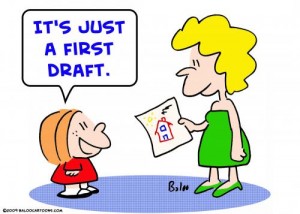 The Mantra
The Mantra
Many screenwriting books and gurus have this mantra: “If you start rewriting before you reach the end of your script, you will never finish it.”
They’ll say, “Try to reach the end of your first draft quickly, so you can get to the rewriting process, where it all comes together.”
I call bull$#!+.
Here are the…
5 Pitfalls of Rushing Your First Draft
While it’s true your script’s first draft should serve as a starting point for refinement, here are some compelling reasons not to rush it.
#5: You might be tempted to send it out
I know screenwriters who have hurriedly completed a first draft because they had an agent or industry contact that was eager to read their script.
Bad idea.
I know it’s tempting, and I understand that industry guy sounded like he needed to see it NOW, but if you really want a shot in Hollywood, you won’t send him your rushed first draft. Unless you’re some sort of writing prodigy (and even then…) your first draft is going to need some polishing before it’s ready to go out.
If your industry contact is legit, he’ll be able to spot an unpolished spec script from a mile away. Here’s some Hollywood math:
1 rushed draft + 1 industry contact = 0 industry contacts
#4: You might jump to another project
When the focus of screenwriting becomes finishing that first draft, it’s easily to have an overinflated sense of accomplishment when that first draft is complete. Some aspiring screenwriters rip through their pages, put only a modicum of effort into the rewrite, then happily begin their next script.
Writing scripts is not just a numbers game. Recently, Julie Gray interviewed Jason Scoggins (a manager and partner at Protocol, a Beverly Hills-adjacent literary management and production company).1 In the interview Jason mentioned that he looks for writers with 2 or 3 strong scripts.
While having written 6 to 8 screenplays still earns you credibility (and means you’ve been honing your skills), when it comes time to sell your script, it’s really about quality over quantity. Take your time and make every script count!
#3: You might not develop the requisite writing skills
As a writer, often your most brilliant work comes only after you’ve spent days or weeks fighting your way through a difficult story problem.
If you get into the habit of hopscotching away from these problem areas, you may never develop the skills necessary to defeat the story demons. Even when rewriting, you might feel the urge to avoid a trouble spot by vowing to “come back to it later.”
Professional-level writing takes patience, fortitude, belief in yourself, problem-solving abilities, creative-workarounds, mental gymnastics, buckets of heavily caffeinated coffee, and a myriad of other things you can only learn by forcing yourself to confront these known problems with your script.
I say the sooner the better because…
#2: You might develop an overwhelming script deficit
Many forces can hamper your rewriting efforts, or, worse yet, prevent you from starting them in the first place. One of the biggest culprits is something I call “script deficit.”
Script Deficit: The cumulative script issues that you know you’ll have to eventually fix.
Ever looked at a pile of papers and felt exhausted just thinking about the time it will take you to sort them out? That’s like script deficit. The more it’s allowed to grow, the more difficult it becomes to address the problems, and the more likely it is that you’ll never fix them.
Efficiency experts will tell you that you should only handle a piece of paper once. When you read your mail, deal with it right away. Don’t put it on the “I’ll do it later” pile, because then you’ll have to reacquaint yourself with the material and thus spend double the amount of time dealing with it.
Screenwriting is like that. I’m not saying that you need to perfect every little issue as you go along, but if you know there’s a fundamental problem with the scene you’re working on, you’ll be doing yourself a favor if you try to tackle that problem now.2
As script deficit grows, it makes the task of rewriting more daunting… and it becomes all too easy to add that first draft to the “I’ll do it later” pile.
#1: You might not want to change something fundamental
Let’s face it, even if you rush through a first draft of your script, odds are you’ve still spent several weeks or months working on it. That’s a huge investment of time.
As humans we don’t like wasting our time. As such we conjure up all sorts of psychological tricks to get out of doing more work. If we spend four hours painting a large room, only to have the paint dry and discover it’s the wrong shade, we might be inclined to say, “You know, it’s really not that bad.”
The same thing happens with screenwriting. I can’t tell you how many times I’ve seen writers discover and acknowledge a fundamental change that needs to be made to their screenplay, only to reflect later, “You know, it’s really not that bad.”
Obviously these types of problems would ideally be sorted out in the pre-writing or outlining phase. But sometimes you just don’t know how something’s going to shake out until you try it.
If you’re writing a scene, and it just isn’t working, you owe it to yourself to take a shot at finding out why that is, before moving on. You may just discover that something fundamental needs to be changed in your script. If you make this discovery on page 10, you’re much better off than making this discovery on page 110.
Summary and Exceptions
Just to be clear — I’m not saying that you should perfect every scene and detail before moving on to the next. I’m saying that you shouldn’t feel pressured to push forward in order to meet an arbitrary daily page count, or out of fear that you may never finish your script, or out of a mistaken belief that finishing your first draft equates to success.
The fact of the matter is that good screenwriting is really hard work. If you’ve got what it takes, come hell or high water you’ll finish that script. Writers write.
Whether you fix your scenes as you write them or after you’ve finished the first draft — you still have to fix those accursed scenes! And even the best first draft will still require multiple rewrites and passes after you’ve solicited feedback.
Don’t worry about crossing your t’s and dotting your i’s as you go along, while at the same time, don’t let some “finish that script” mantra stop you from rewriting a scene until you’re happy with it. Everyone’s writing style is different.
Feel free to rush to the finish line of your first draft if you fall into one of these categories:
- You’ve written a bullet-proof outline, and already know the ins and outs of every scene
- You’re a first-time writer and just want to see if you can write a feature screenplay
- You write or rewrite to find your story (outlining just doesn’t work for you)
- Everything’s flowing and you’re “in the moment” with a blast of creative energy (you can whittle it down later)
- You treat your first draft like a true “rough copy” — knowing that wholesale swaths of it will need to be rewritten
How about you? Do you wait until you’ve completed your first draft before rewriting anything?




As my partner and I have evolved, a lot has changed. We used to not outline. Now we do — extensively.
We’re in the midst of writing a first draft right now. For this script, we did a rewrite before it was done. But there was a very good reason for doing so. I had written a rough draft of act 1, and I knew the pacing was off, but I also knew I didn’t have enough mental distance from the script to quickly and effectively correct it (and we are on a self-imposed deadline). So I had my writing partner go over it. He rewrote that portion and moved some of my story beats around before he started writing the first section of act 2.
Now I’m working on the tail end of act 2 and act 3 is going to be short, so we should have the majority of the first draft completed with only two weeks of actual writing time — and each of us only put in a few days on it, writing about 25 pages per week apiece. We spent two weeks prior to that nailing down the details of the outline (10 pages), and the concept had been brewing for a couple of months before that.
Even with a solid outline, flaws start popping up as soon as you start putting it to paper. So if you identify a structural flaw in your screenplay during the first draft stage, then you need to correct that flaw as quickly as possible. And if you can’t correct it, you may not have a viable script and shouldn’t be wasting your time anyway.
It’s still very much a first draft, but when you outline extensively, you end up with a first draft that’s more like a second draft. It saves you a lot of time and gives you a much easier way of wrapping your head around your story because you know exactly what is going to happen when.
It also enables you to COMPLETELY avoid script deficit or extensive rewrites, which can exhaust you and make you hate whatever was noble and good about your script. Save that for paid rewrites when you make it in Hollywood. 🙂
Holy cats — 25 pages per week! Well done. I admire your discipline. Deadlines can be a wonderful tool.
And yes — outlines, it’s amazing the difference they make in terms of time savings. “An ounce of prevention” as they say…
Great to see you and your writing partner took the initiative and started rewriting when you found the pacing issue. I appreciate your posting the anecdote which reinforces my message nicely.
Sounds like you’re on track for a great script. Wishing you all the best!
You were right on the mark. I made many of the mistakes you cautioned against and now am overwhelmed by what I have to correct.
Mitch
Hey Mitch,
Trust me, we’ve all been there before. Fortunately, with every script we write, we learn new lessons and it gets easier. And the good news is that even a page-one rewrite is easier to deal with than starting with a blank page. Keep fighting the good fight!
Hi! Many thanks for the time taken to put this article together – certainly addressed a wide range of writer scenarios.
I admit, I’m one of those that does believe in a quick first draft. Completely contrary to your great advice, I deliberately consign that first rough to the “to do” list. 🙂 But there’s method to even this madness. I tend to write alone, which makes it difficult to get editorial distance. Keeping the write-madly-while-crazy-about-an-idea phase of work separate from the butt-to-seat-tearing-apart-and-making-good phase is pretty essential to me. I get that distance by planning to put every script away for several months between the writing and the re-writing.
The “planning” part of that is important for me. I’ll have several scripts in the pipe all the time: One in the madly-writing phase, one in the distancing phase, and one in the revision stage. For me, mornings are the best time for creating new material, so I do it then. When I worked a day-job, that was *early* in the morning. Day time is for out and about in the real world, eavesdropping and seeing interesting people and things, finding new ideas for the next script. Evening is my revision time. (Afternoons and evenings can be switched interchangeably, depending on when interesting things or events are on.)
Everyone’s psychology is different. We’re inspired by different things. Deadlines work for me. I give myself a deadline to write a first draft. Then the script HAS to sit untouched in the pile for 60-90 days – but no more. There’s a bit of reverse psychology at work there too. If I refuse to let myself work on that script for that period of time, I WANT to work on it. I’m thinking hard about what I’m going to do with it when I can get my hands back on it! I’m anxious to get back to it. But, I’m working on the next script while the first one simmers on my mental back burner.
Revisions have a deadline too, sort of. Nothing goes out before it’s been beaten into something I’m not ashamed to send out, but, I have a plan during revisions, to help avoid the inevitable procrastination. Dialogue, action, structure, characterization, theme… all those important elements get their own draft. To try and avoid the endless revision trap, I plan to have a reader-worthy draft to an outside set of eyes within 2-3 months of starting revision.
The creation of a script is a process from idea to finished document. Slamming that first draft onto the page isn’t the whole process, but, it can be PART of an overall strategy to get to the polished finished product.
Hope this helps someone get their own polished product in good hands.
Hi Ngaire,
I really like your approach, and I agree with you — slamming that first draft onto the page can indeed be part an an effective overall strategy. You just have to have the discipline and foresight to devote enough time to the rewriting phase. It’s obvious you have that in spades, so you’re good to go.
I’m going to promote your thoughtful comments to a feature post this week.
Thanks for stopping by the site!